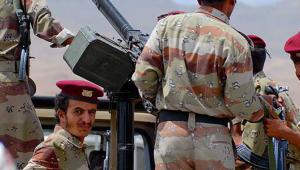In their first joint report, the UK’s International Development Select Committee and the Business, Innovation and Skills Committee said there was credible evidence that Saudi Arabia’s bombing campaign in Yemen, which began last year, had indiscriminately targeted civilians.
It noted that given the long history of substantial arms sales from the UK to Saudi Arabia, which was valued at £2.95bn in the first nine months of 2015 alone, it was unlikely that no British arms were being used in the campaign.
Under Britain’s arms export licensing criteria, licences should not be granted where there is a clear risk that items sold might be used to violate international humanitarian law, which provides clear protections for civilians and civilian targets like hospitals.
Well-respected NGOs and the United Nations have documented incidences where Saudi bombs have been dropped on schools, hospitals and homes, and resulted in civilian casualties. But the UK government maintains there is no evidence of this.
An inquiry into the allegations is currently ongoing. However, this is being led by the Saudis themselves.
Stephen Twigg, chair of the International Development Select Committee, reiterated that the MPs “remain unconvinced” that the Saudis are best placed to investigate their own violations of humanitarian law.
The report pointed out that the results of Saudi investigations contradict those of bodies like the UN, and lambasted the UK government for, on a number of occasions, guaranteeing it had conducted its own checks, only to admit later that it had not.
It could not be certain that British arms had not been used against civilians without a truly independent inquiry, the report said, suggesting this should be lead by the United Nations.
But as well as refusing to concede there is a case for revoking arms export licenses for Saudi Arabia, British MPs have also rebutted arguments that the inquiry should hand over control to a party more free from bias.
So far, the report concludes, the British government has made no meaningful response to the allegations raised and its continued sale of arms to the Saudis potentially confers legitimacy on Saudi Arabia’s campaign.
It is problematic, the report noted, that while the government was in receipt of reports documenting the alleged violations, it chose to speed up the processing for new export licences for Saudi Arabia.
Meanwhile, since Saudi Arabia began its bombing in March 2015, the conflict has escalated dramatically, especially in terms of the toll it takes on civilians.
Thousands have since been killed or injured, and 82% of the population has been left entirely dependent on stretched humanitarian assistance.
Schools, hospitals and other civilian infrastructure have been devastated and the economy is on the verge of total collapse. Damage to infrastructure and economic losses are estimated at $14bn – a tall order for what was already the Middle East’s poorest nation.
Chris White, who chaired an inquiry into the issue by the Committee on Arms Export and Controls, which came to similar conclusions, and who is a member of the Business, Innovation and Skills Committee, called for immediate action.
“The government can no longer wait and see and must now take urgent action, halting the sale of arms to the Saudi-led coalition until we can be sure there is no risk of violation.”












